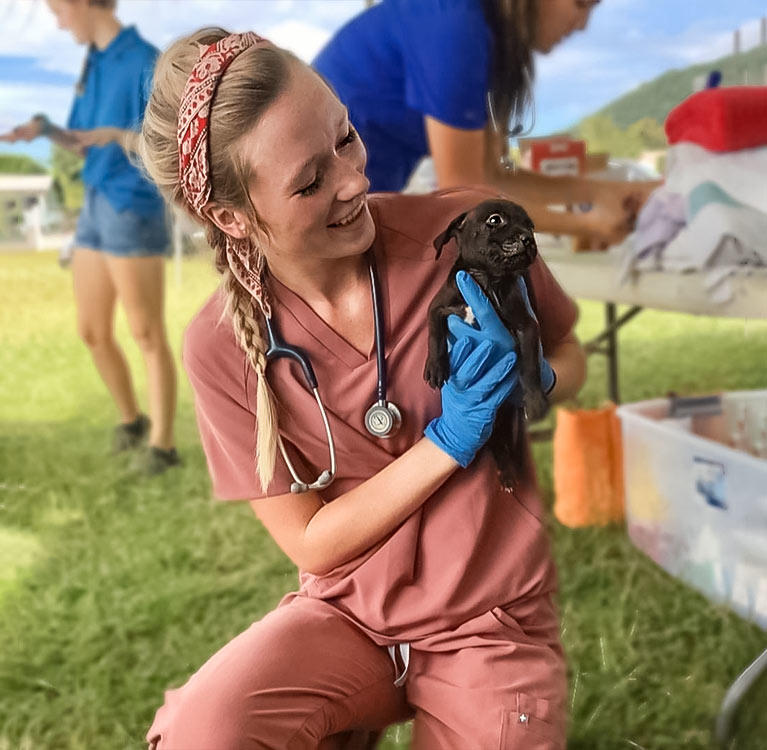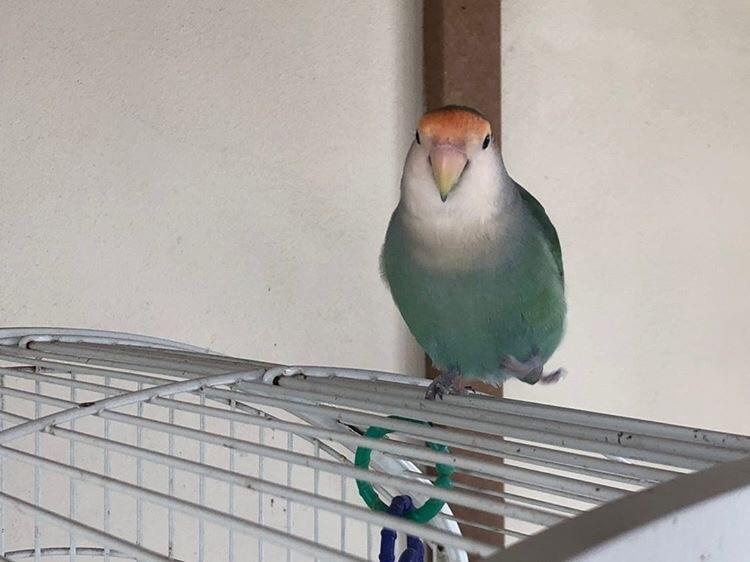If you’re considering becoming a veterinarian, you’ve likely begun the process of researching vet schools to find the program that will provide the best environment for you to achieve your career goals. But one thing that’s not easily answerable from an internet search is knowing what veterinary school is really like and how hard is it to become a vet. There’s no simple answer, and every school and individual’s experience is different. Still, learning some of the details of a school’s program will help paint a picture of what your day-to-day life might look like as you work toward your DVM degree.
Ross University School of Veterinary Medicine’s (Ross Vet) Doctor of Veterinary Medicine (DVM) degree program is accredited* by the American Veterinary Medical Association Council on Education (AVMA-COE). Here, you’ll enter a 10-semester, 3.25-year accelerated program designed to be taken year-round, with three semesters of coursework per year. The first seven semesters are spent on campus in St. Kitts, a Caribbean island known for its beautiful beaches and scenery. The remaining three semesters are devoted to clinical work at one of Ross Vet’s clinical affiliates located in the US, Canada, or abroad.
HOW LONG DOES VET SCHOOL TAKE?
Some common questions you may have when researching how to become a vet are: How long is veterinary school? how many years of school to become a vet? do vets go to med school? What follows is a year-by-year description of the life of a student at Ross Vet. This is just a sampling, as you’ll also have a range of elective courses to choose from to tailor your studies to your desired career path.
Year 1
In the first year of veterinary school at Ross Vet, you’ll be immersed in advanced biological science and foundational courses to develop the core competencies you need to become a veterinarian.
Dr. Hilari French, Associate Professor of Theriogenology, breaks down what to expect your first year by semester. “First semester starts out with basic anatomy, physiology, and the introduction of disease processes. Second semester builds upon that knowledge and progresses the student through another course of anatomy, physiology, and adds in immunology and parasitology – building the knowledge skills. Third semester rounds out the foundational courses with the -ologies (Virology, Bacteriology, Pathology) and adds in some clinical nutrition elements.”
One of Ross Vet’s core courses is Essential Veterinary Skills (EVS), a six-semester series that provides multi-species instruction in such topics as animal handling and examination, manual dexterity skills, and communication. The first year also includes several courses on disease and the basic properties of animal viruses, pathogenic bacteria, and fungi.
First-year coursework includes a range of activities, from live animal handling and examination to model- and simulation-based experiences. In the lab, you’ll dissect embalmed canine cadavers and observe prosections (dissection demonstrations by a professor or other experienced anatomist) for other species, among other activities.
Year 1 Curriculum
- Veterinary Professional Foundations
- Essential Veterinary Skills 1 - 3
- Microscopic Anatomy and Embryology
- Gross Anatomy I-II
- Principles of Infectious Disease
- Physiology I - II
- Principles of Research
- Immunology
- Parasitology
- Case-Based Studies I - II
- Applied Animal Nutrition
- Pathology I
- Bacteriology and Mycology
- Virology
Year 2
The second year at Ross Vet builds on the foundational courses from Year 1 and applies these principles to different animal groups. Courses on small animal medicine, large animal medicine, and avian and exotic animal medicine will give you an overview of common disorders and infectious diseases in different animals and how to treat them. You’ll also take the first of two surgery labs, which mixes lab time with lectures or discussions each week.
Unlike a general medical doctor, all veterinarians must be trained in the principles of general and local anesthesia. You’ll begin this work in your second year, where you’ll get experience administering small animal anesthesia and will observe demonstrations in how to administer general anesthesia for large animals.
The first two years at Ross Vet prepare you for your next phase of veterinary school: clinical training. Dr. French states that “the student’s pre-clinical years (2 years and 4 months – 7 semesters) prepare them to jump into their clinical year at a clinical affiliate prepared with both knowledge and skills that allow for them to excel in any program. The EVS program starts in the first semester with basic animal husbandry and skills instructions and ends in seventh with live animal surgeries. We also develop the student’s professional and ethical understanding of the profession with a course in first and seventh that discusses important topics in the veterinary field.” These courses will provide you with a solid foundation to start your clinical year off with confidence.
Additionally, before you make the transition to your clinical year, Ross Vet’s Clinical Affairs team will meet with you to outline what to expect and to learn about your interests and career goals. These sessions can help you hone your list of preferred schools, which you’ll submit during the first week of your seventh semester.
Year 2 Curriculum
- Essential Veterinary Skills 4 - 6
- Case-Based Studies (III-V?) [Course description says it continues for five semesters but is not listed in the semester 3-5 curriculum]
- Applied Animal Nutrition
- Pathology II
- Clinical Pathology
- Veterinary Public Health and Epidemiology
- Pharmacology
- Toxicology
- Diagnostic Imaging
- Anesthesiology
- Small Animal Medicine I - II
- Avian and Exotic Animal Medicine
- Small Animal Surgery
- Surgery Laboratory I
- Large Animal Medicine I
Years 3 - 3.25
Your third year at Ross Vet begins with your final semester of classes before clinical studies begin. In addition to completing the foundational classes, you’ll learn how to obtain clinical data and gain experience in common veterinary diagnostic techniques. As part of the course, there are mandatory clinical rotations in equine, bovine 1 and 2, small animal clinics, emergency, clinical pathology, and grand rounds, with a wide range of options for elective rotations.
Year 3 Curriculum
- Theriogenology
- Intro to Clinics
- Large Animal Medicine II
- Essential Veterinary Skills G
- Surgery Laboratory II
- Veterinary Professional Foundations II
- Licensing Exam Preparation
CLINICAL EXPERIENCE
Your last three semesters of vet school will be spent in intense clinical training at one of Ross Vet’s 28 AVMA-accredited school affiliates, where you’ll get the hands-on experience needed to transition from student to doctor.
Dr. Erika Little, Associate Dean for Clinical Affairs and Professional Opportunities, shares her insights into what students can expect to experience during their clinical year. You will have the opportunity to “triage and treat emergencies as they come through the door”. You will be expected to “perform surgical procedures on all species, evaluate patients and come up with a list of most likely diagnoses, a plan of how you are going to come to the final diagnosis and a plan for the best treatment for them”. All of which are under the supervision of a board-certified attending. This will likely be the most rigorous period of your vet school experience, with heavy caseloads, patient emergencies, and weekends and nights working on call.
Ross Vet students must complete a minimum of 45 weeks of supervised and evaluated clinical rotations. Dr. Little states that students complete 20 weeks of required core rotations, followed by another 25 weeks of elective/externships which may vary depending on the curriculum of the affiliate they attend.
During your clinical training, you’re nearly at the finish line—but not quite! During this year you will take The North American Veterinary Licensing Examination (NAVLE®), which is offered every spring and fall.
After successfully obtaining your DVM degree, you’ll join nearly 7,000 Ross Vet graduates working in private practice, conservation, academia and beyond. To learn more about the veterinary school experience at Ross Vet, start here!
Related resources:
*Ross University School of Veterinary Medicine confers a Doctor of Veterinary Medicine (DVM) degree, which is accredited by the American Veterinary Medical Association Council on Education (AVMA COE), 1931 N. Meacham Road, Suite 100, Schaumburg, IL 60173, Tel: 800.248.2862. For more information please visit https://www.avma.org/education/accreditation-veterinary-colleges.
The AVMA COE uses defined standards to evaluate veterinary medical education programs, including facilities, clinical resources, curriculum, faculty, student outcomes and research programs. The standards are interpreted and applied by the AVMA COE-accredited veterinary medical education programs in relation to its mission.
*Please refer to the RUSVM Accreditation Page at http://www.rossu.edu/veterinary-school/Ross-University-School-of-Veterinary-Medicine-Accreditation.cfm for more information.






